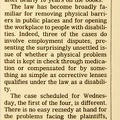26A
Denver Rocky Mountain News
World & Nation
Insidedenver.com/keyword: AP
News Desk — (303). 892-2728
e-mail newsdesk@denver-rmn.com
[Headline] Court rules in favor of disabled
[Subheading] Supreme Court says group homes appropriate for some hospitalized mental patients
By Linda Greenhouse
The New York Times
WASHINGTON Isolating people with dis-abilities in big state institutions when there is no medical reason for their confinement is a form of discrimination that violates federal dis-abilities law, the Supreme Court ruled Tuesday.
The 6-3 decision, in a case brought against the state of Georgia by two women with mental impairment, was a substantial victory for a disabilities rights movement. That movement has looked to the Americans With Disabilities Act of 1990 as a tool for breaking down institutional walls that separate people with serious mental and physical problems from the larger community.
The ruling affirmed, in most respects, a decision last year by the federal appeals court m Atlanta, which held that states have a duty under the 1990 law to provide care in group homes when medically appropriate.
In 1994 the federal appeals court in Philadelphia, in the only other appellate decision on
[separate article begins] IN COLORADO
Activists for the disabled in Colorado said Tuesday's Supreme Court decision is a major victory.
"It's a critical step to show the state that people have the right to choose where and how they receive services and that segregated services will not be tolerated," said Joe Ehman, organizer with ADAPT, which works on issues for the disabled.
"It says to (Gov. Bill) Owens that people have a right to choose where they live, and it's not the state's job to do that."
Colorado was one of seven states that supported a Georgia law that kept two women in mental hospitals long after
Georgia's department of human services recommended they be transferred to the community.
Mike McLachlan, solicitor general with the Colorado Attorney General's office, said he had not seen the decision. However, he said he believes that the ruling will have little impact on Colorado.
"Colorado already by law encourages community settings instead of institutions," he said. "The question is the speed by which the people who are in institutions must be integrated into the community."
It was not known Tuesday how many people in Colorado would be affected.
— Tillie Fong, News Staff Writer
[this article ends]
[originally article resumes] the subject, reached the same result.
The Supreme Court's decision six months ago to hear Georgia's' appeal in this case alarmed advocates for people with disabilities, who feared that the court might steer the law in the opposite direction and reverse the
nationwide trend toward deinstitutionalization. An unusually vigorous grass-roots campaign sprang up around the case, leading 15 of the 22 states that had originally supported Georgia to disavow the state's position in the Supreme Court.
The case involved a 1995 lawsuit filed on behalf of Lois Curtis and Elaine Wilson, both of them mentally retarded and mentally ill, who sought state care outside the Georgia Regional Hospital, where they had lived, off and on, for years. Both remained in the hospital for sever-al years after state doctors had concluded that they could be more appropriately cared for in small group homes.
In some respects, the decision Tuesday was the court's first, rather than last, word on the subject, and it may require more cases to clarify the full dimensions of the ruling.
Justice Ruth Bader Ginsburg's majority opinion held that states' obligation to care for people in small, neighborhood-based settings was limited to some degree by available resources. States are not required to close their big hospitals — which, the court stressed, may still be appropriate for some people — or to create group home programs that they do not now have. In fact, though, every state now has such a program.
The decision interpreted a regulation that requires states to make "reasonable modifications" in their programs to avoid discriminating against people with disabilities, while at the same time providing that states heed not make "fundamental" alterations.
- Sukurta
- Ketvirtadienis 18 Liepa 2013
- Paskelbta
- Pirmadienis 9 Rugsėjis 2019
- Apsilankymų
- 216
- Įvertinimo rezultatas
- nėra įvertinimų
- Įvertinti šią nuotrauką
- Make
- Canon
- Model
- Canon EOS 40D
- DateTimeOriginal
- 2013:07:18 11:02:56
- ApertureFNumber
- f/11.0


0 komentarai(-ų)